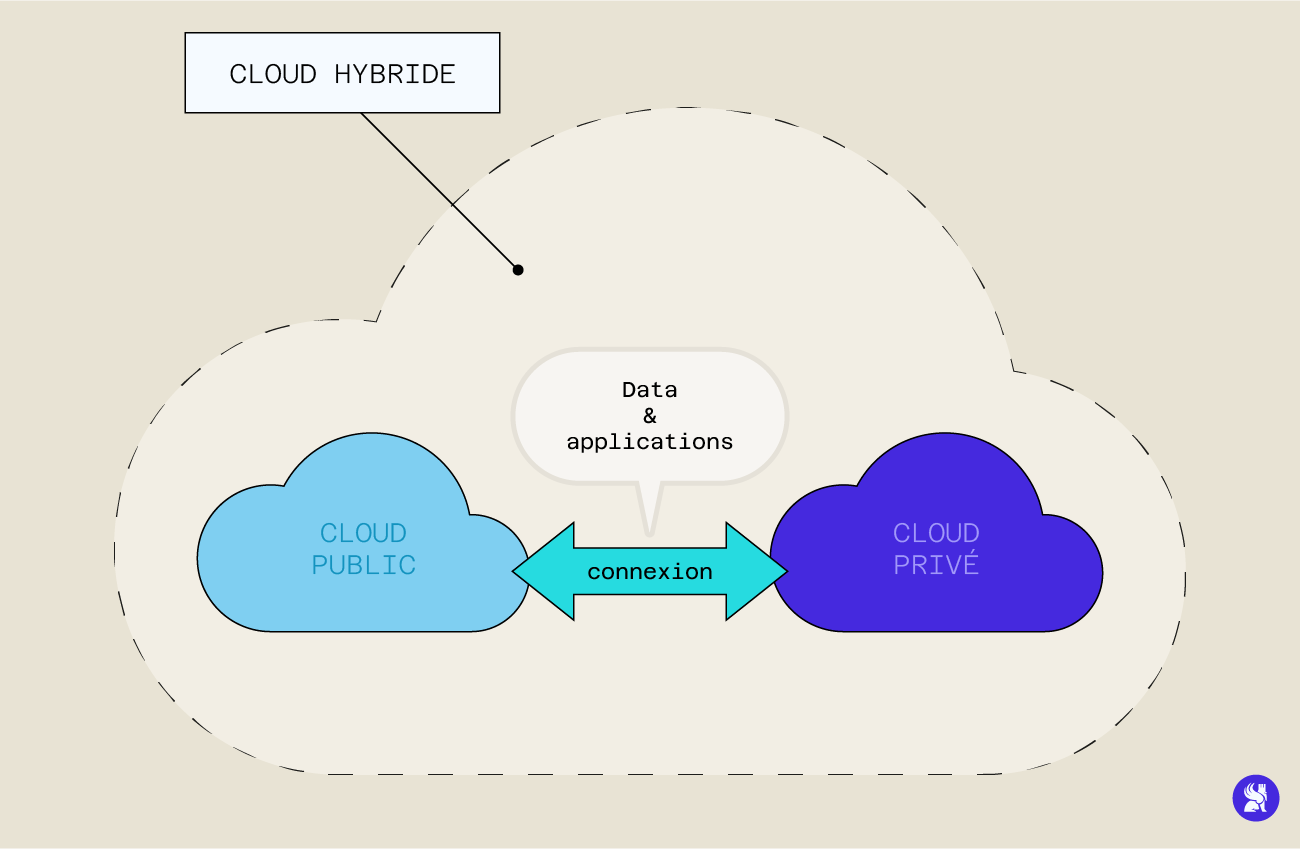The Cloud Computing revolutionized the way companies manage their data and applications. The advent of Cloud infrastructures has enabled companies to store, process and access their data and applications more efficiently and cost-effectively than ever before. However, not all companies are ready to move all their data and applications to the public Cloud. That's where hybrid cloud infrastructure comes in.
What is a hybrid cloud infrastructure?
A hybrid cloud infrastructure combines public and private cloud resources in a single infrastructure. This enables companies to store their sensitive data and applications in a private environment, and at the same time benefit from the advantages of the public cloud for other applications. Almost all hybrid clouds include third-party public cloud providers, such as Amazon Web Services (AWS), Microsoft Azure, Google Cloud Platform (GCP), IBM Cloud, Oracle Cloud and others.
Hybrid Cloud combines the advantages of public and private Cloud infrastructures. It enables companies to deploy and operate applications in the public cloud using the resources of third-party providers, while retaining control of their sensitive data and on-premises applications. Companies can also transfer workloads between the public and private clouds as and when required.

How does hybrid cloud infrastructure work?
Hybrid Cloud infrastructure combines public and private Cloud resources in a single infrastructure. Sensitive data and applications are stored on the company’s own servers, while less sensitive applications can be stored in the public Cloud. Third-party public cloud providers can provide services such as storage, processing power, applications, security, backup and recovery.

Cloud principles
Hybrid Cloud encompasses a range of services from Platform Integration as a Service (iPaaS) to Services as a Service (SaaS). Here’s an overview of the key principles behind each service:
1. Platform integration as a service (iPaaS)
1. Platform Integration as a Service (iPaaS)a iPaaS enables the integration of different public and private Cloud services for better data utilization. Companies can use iPaaS to link existing systems to Cloud applications, and thus improve the efficiency of their operations.
2. Platform-as-a-service (PaaS) infrastructure
PaaS services enable developers to create applications using Cloud platforms. Companies can use PaaS services to create low-cost applications without having to buy additional hardware.
3. Infrastructure en tant que service (IaaS)
IaaS provides on-demand computing, storage and network resources for applications and data. Companies can use IaaS to run applications and store data on Cloud servers rather than on site.
4. Software as a Service (SaaS)
SaaS services are Cloud applications that can be accessed via the Internet. Companies can use SaaS services to access applications such as customer relationship management, accounting and enterprise resource planning without having to install or manage software locally.
In short, the hybrid cloud comprises a variety of services ranging from iPaaS to SaaS, each offering specific advantages for businesses. Companies can use a combination of these services to create a customized Hybrid Cloud infrastructure that meets their specific needs in terms of IT resources, security, cost and performance.
The benefits of hybrid cloud
Hybrid cloud infrastructure offers many advantages for businesses. Here are some of the key benefits:
Flexibilité
Hybrid Cloud infrastructure enables companies to transfer workloads between the public and private clouds according to their needs. Companies can also scale resources up or down according to demand. This enables companies to manage traffic peaks efficiently and avoid the high costs associated with over-utilization of resources.
Security
Hybrid Cloud infrastructure enables companies to store their sensitive data and applications in a private environment and benefit from the security measures of the public Cloud. Third-party public cloud providers are often equipped with enterprise-grade security measures, such as two-factor authentication, data encryption, intrusion detection and more. This enables companies to benefit from enhanced security for their sensitive data.
Cost
Hybrid Cloud enables companies to cut costs by using less expensive public Cloud resources for less sensitive applications, while keeping sensitive applications and data on site. This enables companies to reduce infrastructure management costs, such as purchasing, maintaining and upgrading on-premise equipment.
Scalability
Hybrid Cloud enables businesses to benefit from the ability to scale and add additional resources to meet growing user demand. Companies can easily add or remove public cloud resources as needed, without having to worry about the increased costs associated with purchasing and managing additional on-site equipment.
Service client
Third-party Public Cloud providers often offer high-quality customer service to help companies resolve technical issues. Companies can benefit from the expertise and experience of public cloud providers to quickly resolve technical issues related to the use of the public cloud.
Redundancy
Hybrid Cloud infrastructure enables businesses to benefit from redundancy and continuous availability of applications and data. Companies can replicate their data to third-party public cloud servers to guarantee continuous availability in the event of a server failure or major incident.
Best performance
Hybrid Cloud infrastructure enables companies to benefit from better application performance by deploying public Cloud resources for processing-intensive tasks. Public Cloud providers are equipped with state-of-the-art hardware and high processing capacity to guarantee better application performance.
The challenges of hybrid cloud infrastructure
While hybrid cloud infrastructure offers many advantages for businesses, it also presents certain challenges. Here are some of the key challenges:

Management complexity
Hybrid Cloud infrastructure is often complex to manage due to the diversity of public and private Cloud environments. Companies need to manage multiple public and private Cloud platforms, which can be difficult to manage without the right technical expertise.
Infrastructure security
Although hybrid cloud infrastructure enables companies to benefit from enhanced security measures, it also presents additional security risks. Companies need to be aware of these risks associated with managing multiple public and private cloud environments, and take steps to reduce them.
The cost
Indeed, hybrid Cloud infrastructure enables companies to reduce costs, but it can also be costly to manage if not properly managed. Companies adopting this methodology need to be aware of the costs associated with managing multiple public and private Cloud environments, and take steps to minimize costs.
Application integration
Hybrid Cloud infrastructure can be difficult to integrate with existing applications. Companies need to ensure that existing applications can be successfully integrated into the hybrid cloud environment without disrupting business operations.
Conclusion
The hybrid cloud is an increasingly popular solution for businesses looking to maximize the benefits of both public and private clouds, while minimizing the drawbacks associated with each option. While this approach presents challenges, it can offer significant advantages in terms of flexibility, cost, security, performance and redundancy.
Ultimately, the decision to adopt a hybrid cloud infrastructure depends on the specific needs of each company. They need to carefully assess their IT resource, security, cost and performance requirements before deciding whether or not to adopt a hybrid Cloud infrastructure. However, for many companies, this approach can offer an optimal balance between the advantages of public and private clouds, while minimizing the disadvantages.
If you want to become an expert in Cloud Computing, DevUniversity is the ideal choice. Our distance learning courses will give you the skills you need to become a qualified cloud engineer! And if you’re interested in the benefits of the cloud, take a look at our complete dossier on Azure and AWS to find out more.










